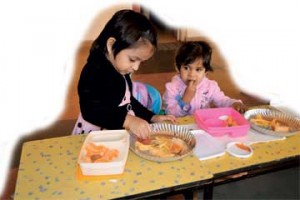Seetha Anand Vaidyam
 The early years from 0 to 7 are called the formative years. During this period, children experience the maximum physical growth. This is evident from the fact that at birth, infants weigh about 2.5 kg and by the age of 7 their weight is expected to range between 23 and 25 kg. This is an increase of almost 23 kgs within a 7-year period. At no other stage in one’s life would it be healthy to gain this amount of weight in these many years. It is not just about weight/height gain. It is during these years that internal organs attain proper growth; the skeletal, muscular, and neural systems establish strong foundations to last us a lifetime. Children below the age of 7 are generally very active and require a lot of energy. The sense of ‘life’ is one of the most intangible of senses in children. This sense of life helps us to be present and attentive and gives us enthusiasm and hope to continue learning. This is considered a ‘lower’ sense and needs to be integrated in the formative years. Children need foods that are fresh and wholesome and that have “life” to provide them with sense of life.
The early years from 0 to 7 are called the formative years. During this period, children experience the maximum physical growth. This is evident from the fact that at birth, infants weigh about 2.5 kg and by the age of 7 their weight is expected to range between 23 and 25 kg. This is an increase of almost 23 kgs within a 7-year period. At no other stage in one’s life would it be healthy to gain this amount of weight in these many years. It is not just about weight/height gain. It is during these years that internal organs attain proper growth; the skeletal, muscular, and neural systems establish strong foundations to last us a lifetime. Children below the age of 7 are generally very active and require a lot of energy. The sense of ‘life’ is one of the most intangible of senses in children. This sense of life helps us to be present and attentive and gives us enthusiasm and hope to continue learning. This is considered a ‘lower’ sense and needs to be integrated in the formative years. Children need foods that are fresh and wholesome and that have “life” to provide them with sense of life.
Observation and imitation is how children learn! This holds true for good eating habits too. Therefore adults should be mindful of what they eat, how they eat, and when they eat. Adequate measures of raw food, freshly cooked food, and a variety of whole foods should be a part of daily meals. Ideally, eating together as a family or as a whole class in school will foster a sense of joy and enthusiasm towards meals. Saying grace to thank those who made the food, lighting a lamp, or setting the dining area in an aesthetic manner are small measures that go a long way in creating respect and enthusiasm for food.
The author is a Remedial Therapist and Early Childhood consultant and trainer. She is also the author of ‘“Good” Food – a guide to right cooking and eating’. She can be reached at seethaanand@yahoo.com.
